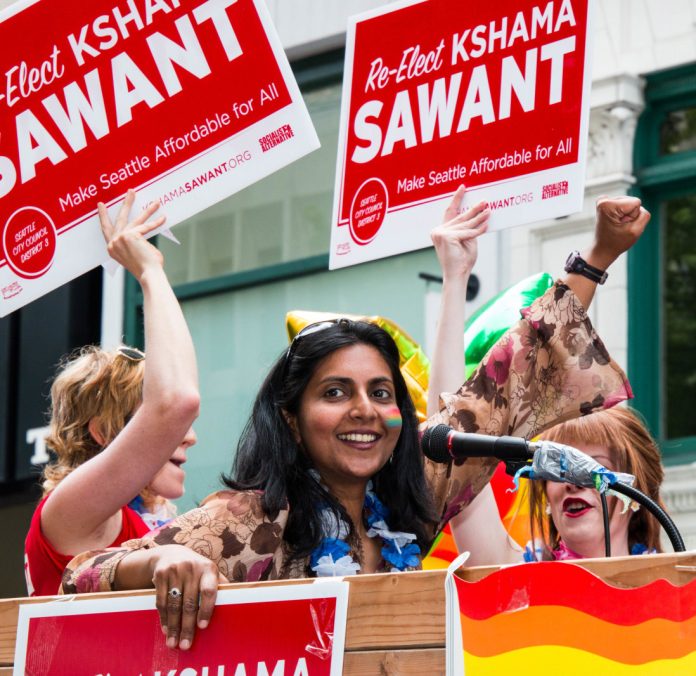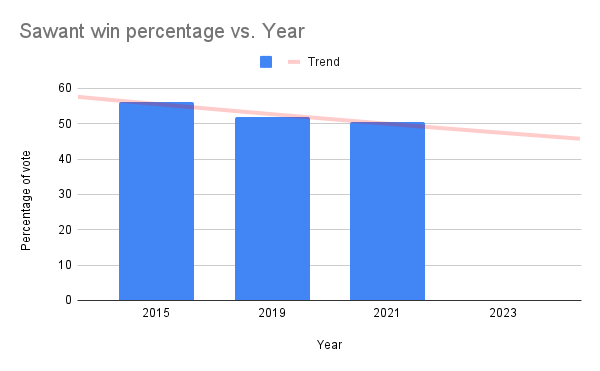In office since 2014, Kshama Sawant is Seattle’s longest tenured city councilmember, but she announced this morning she is not running for reelection in 2023. After a decade on Council, Seattle’s only socialist and only non-Democrat councilmember said she is shifting gears to launch a new political party called “Workers Strike Back” that appears focused on national political battles over the local ones that consume most of a councilmember’s time.
Sawant’s announced departure makes Council District 3 the fourth open seat after three of her colleagues — Lisa Herbold (D1), Debora Juarez (D5), and Alex Pedersen (D4) — also announced retirement plans.
Only Councilmember Andrew Lewis of District 7 has announced plans to run for reelection, but Councilmembers Dan Strauss (D6) and Tammy Morales (D2) may join him, as they have not yet announced their plans. With at least four open seats in play, the makeup of the Seattle City Council could change considerably, with newly redrawn council districts also a factor deciding which candidates may thrive in these races.
Both in her livestreamed announcement press conference and op-ed in The Stranger, Sawant pointed to the limitations as one councilmember on a body of nine as a reason to leave and focus instead of a new party which could foster the mass movement she said is necessary to bring about the socialist victories for workers she is seeking.
“There is a vacuum of real left leadership, locally and nationally,” Sawant wrote. “We need a new party for the working class—one that holds elected officials accountable, that bases itself on social movements, that organizes alongside workers on the streets and in workplaces.”
As usual, Sawant took some shots at corporate politicians and media, but she also turned her fire on the Democratic Socialists of America (DSA) and the Congressional Progressive Caucus, criticizing Representatives Alexandria Ocasio-Cortez (AOC) and Seattle’s own Pramila Jayapal. She cited their recent vote to force striking railroad workers back on the job to argue they had abandoned workers and gotten rolled by corporate party leaders.
“We cannot put our faith in the AOCs or the Pramila Jayapals, even though I understand there were many who had high expectations for them,” Sawant wrote. “AOC recently claimed that she could not fight against Democratic leaders on behalf of workers because it would cause ‘relational harm’ with those party leaders. What about the vast and very real harm taking place in the absence of such a fight for our needs?”
Worrying about relational harm with her colleagues is something Sawant rarely has done in her Council career, which has allowed her to be a firebrand with biting criticisms of just about everyone in Seattle politics. That unapologetic style has at times worked to score big victories, such as forcing Seattle’s $15 minimum wage when then-Mayor Ed Murray was desperately looking for a softer compromise.
But it is also fair to say Sawant’s spurning of relationships and compromise at times reduced her ability to impact policymaking and pass legislation. One could even argue that leaning into national fights and squabbles rather than local policymaking and constituent services has slowly sapped her support in one of the most left-leaning districts in Seattle.
Riding high after the fight for $15 win, Sawant won 56% of the vote in her first reelection contest in 2015 — her highwater mark. Since then, her margins have tightened considerably as she grabbed 51.8% of the 2019 vote and 50.4% of the 2021 recall vote. It appeared she had a tough reelection fight in store in 2023.
Sawant’s first citywide race in 2013 (before the city switched to council districts) was a dramatic comeback in late returns over longtime Councilmember Richard Conlin. It shocked the pundits at the time and marked a tectonic shift in city politics, heralding the emergence of a resurgent left. More progressive-leaning Democratic councilmembers did join Sawant on council over the next two elections, but Sawant’s Socialist Alternative party was never able to follow up or gaining additional seats in the city or region.
Still, despite the lack of further electoral success, Sawant has spoken repeatedly on building a mass movement that will sweep the working class into power. She now has the opportunity to do that full time without the worry of Council responsibilities.
Even with her attention shifting to launching a new party, Sawant pledged she would not let up in her final year in office.
“While I’m sure the corporate establishment in Seattle will be very happy with the news that I am not running again, they shouldn’t rush to mix their martinis just yet, because we are not done here,” Sawant wrote. “My Council office will continue fighting relentlessly for working people right up until the final days of my term. We will be bringing rent control for a vote, and alongside our new organization, Workers Strike Back, we will be building our movement for renters’ and workers’ rights. And when this term is over, we will continue to be disturbers of the political peace in Seattle, as well as nationally, whether inside or outside City Hall.”
A statewide rent control ban inhibits Seattle’s ability to pass rent control at the city level, and past efforts to repeal the ban have quickly fizzled. However, Rep. Nicole Macri introduced a statewide rent stabilization bill (HB 1388) this year with 31 co-sponsors, which suggests support for stabilizing rents is at least growing. Still, getting to 50 votes could be tough this session.
No state bills have been proposed, however, allowing Seattle to implement rent control on its own, which suggests Sawant’s proposal to pass a “trigger” rent control policy awaiting state repeal would continue to wait. Moreover, passing a rent control policy that is too strict could end up proving counterproductive and causing housing production to dry up in Seattle, whereas research suggests carefully calibrated rent stabilization policies can avoid those drawbacks.
See more of The Urbanist’s coverage of Councilmember Sawant over the years. And visit the Workers Strike Back website to follow the councilmember’s new endeavor.
Doug Trumm is publisher of The Urbanist. An Urbanist writer since 2015, he dreams of pedestrian streets, bus lanes, and a mass-timber building spree to end our housing crisis. He graduated from the Evans School of Public Policy and Governance at the University of Washington in 2019. He lives in Seattle's Fremont neighborhood and loves to explore the city by foot and by bike.



